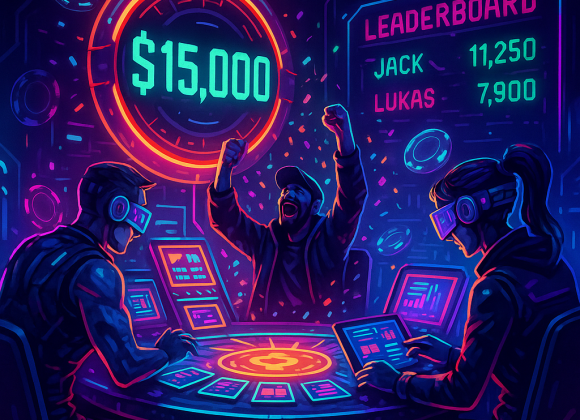Gambling has evolved dramatically over the past couple of decades, shifting from traditional brick-and-mortar establishments to a vibrant digital landscape. While this transition has made gambling more accessible than ever, it has also introduced new dangers, particularly in relation to addiction. In this article, we’ll explore the unique risks associated with online gambling, peeling back the layers of this digital phenomenon to uncover why it can be particularly perilous.
1. The Digital Playground: Where Risks Multiply Online!
Online gambling platforms have transformed into expansive digital playgrounds, offering an array of betting options at users’ fingertips. With just a few clicks, players can dive into an ocean of slots, poker, and sports betting. This accessibility presents a tempting lure but also magnifies risks. Unlike traditional casinos, which provide a physical space that can limit exposure, online platforms are infinite—bringing new games and promotional offers that can lead to impulsive betting.
The digital environment can also easily desensitize players. With flashing lights, catchy slogans, and enticing graphics, online gambling sites are designed to capture attention and keep users engaged. This constant barrage of stimuli can create an addictive cycle where the thrill of gambling overshadows the potential risks involved.
Moreover, the absence of physical interaction with other players or dealers creates a disconnect. Gamblers may not recognize how their habits compare to those of other players. This lack of comparison can lead to the normalization of excessive gambling—where the player might think their behavior is acceptable because “everyone is doing it.”
Additionally, online platforms often employ sophisticated algorithms to encourage repeated play. For example, personalized recommendations based on betting history can create a tailored experience that feels irresistible. In this digital space, risk multiplies not just through the variety of gambling options but through the very design of the platforms themselves.
Education about the risks of online gambling is crucial. By recognizing these unique elements of the digital gambling landscape, players can better understand the dangers they may encounter.
2. 24/7 Access: How Convenience Fuels Gambling Addiction
One of the most striking aspects of online gambling is its round-the-clock availability. Unlike traditional casinos with their limited hours, online platforms are open 24/7, making it all too easy for individuals to gamble at any time of day or night. This convenience can quickly morph into a dependency, as players can engage in betting at their convenience, often leading to excessive gambling sessions.
This relentless access can blur the lines between leisure and obsession. What begins as a casual pastime can transform into compulsive behavior, especially when players find themselves gambling during moments of stress or boredom. The convenience of online gambling means that individuals can place bets while watching television, during a lunch break, or even in the middle of the night, leading to prolonged gambling sessions that might go unnoticed.
Additionally, the rise of mobile gambling apps has made it even easier to indulge in betting. Players can access their favorite gambling sites on their phones, allowing them to gamble anywhere and anytime. This mobility can foster a “just one more bet” mentality, where players find it increasingly challenging to resist the temptation to gamble because it’s always within reach.
Furthermore, the thrill of instant gratification has never been more accessible. In the digital arena, the results of bets are often instantaneous, creating an adrenaline rush that can lead to overindulgence. The ease with which players can deposit and withdraw funds online further fuels this cycle—making it all too simple to cash in and keep playing.
Finding balance and establishing boundaries is essential in this environment. By recognizing the dangers posed by the convenience of online gambling, individuals can take proactive steps to protect themselves from addiction.
3. The Illusion of Control: Online Gambling’s Sneaky Trap
At its core, gambling often feeds into the illusion of control—where players believe they can influence outcomes through skill or strategy. This is particularly prevalent in online gambling, where players may feel empowered by their access to information and tools to improve their odds. However, this perception can be deceptive and can lead to a slippery slope of compulsive gambling.
For instance, many players convince themselves that they can “beat the system” by studying game strategies or tracking trends. This belief can encourage them to gamble more often and invest larger amounts of money, ultimately leading to greater losses. The online environment further exacerbates this illusion, as players may become engrossed in carefully analyzing data and statistics, which can foster a false sense of mastery over the games.
The instant feedback mechanism of online gambling also plays a role in reinforcing this illusion. Players can quickly see the outcomes of their bets, which can create a dopamine rush that promotes continued play. Each win, however small, serves to reinforce the belief that they are in control, even if the odds are fundamentally stacked against them.
Moreover, many online gambling sites implement features like leaderboards and achievement badges, which can further inflate a player’s sense of achievement and control. These gamified elements may lead individuals to take greater risks in their gambling, blurring the line between responsible play and irresponsible behavior.
Acknowledging the illusion of control is vital for anyone engaging in online gambling. By understanding the psychological traps that online gambling presents, players can better navigate their experiences and make informed choices.
4. Social Isolation: Why Online Gamblers Feel Alone Together
While online gambling may seem like a solitary activity, it can create a paradoxical sense of social isolation. While players may connect with others through chat features or forums, these interactions often lack the depth of face-to-face communication, leaving many individuals feeling more isolated than ever.
The very nature of online gambling encourages players to engage with their screens rather than with the people around them. This lack of real social interaction can lead to feelings of loneliness and disconnection, which may drive individuals to gamble more as a coping mechanism. The irony is that, while players may believe they are part of a larger community, they are often experiencing their addiction in isolation.
Additionally, the stigma associated with gambling addiction can make it difficult for individuals to reach out for help. Many may fear judgment or misunderstanding from friends and family, leading them to keep their struggles hidden. This secrecy can deepen feelings of loneliness and despair, creating a vicious cycle that perpetuates addiction.
Online gambling can also consume significant time, leaving little room for meaningful relationships. As individuals prioritize gambling over socializing, important connections can weaken, leading to further isolation. This disconnect can exacerbate mental health issues, leading to deeper struggles beyond gambling addiction alone.
Recognizing the social dimensions of online gambling can be an essential step in addressing addiction. Building supportive communities, whether online or offline, can help individuals combat feelings of isolation and provide a sense of belonging.
5. The Role of Anonymity: Hiding Behind a Screen!
The anonymity provided by online gambling platforms can be a double-edged sword. On one hand, it allows players to engage in gambling without the judgment or scrutiny they might face in a traditional casino setting. On the other hand, this anonymity can embolden risky behavior and lead to escalated gambling problems.
Many online platforms don’t require users to provide personal information upfront, making it easy for individuals to create accounts without revealing their identity. This lack of accountability can lead to reckless gambling, as players may feel shielded from the consequences of their actions. When individuals don’t see the physical manifestations of their gambling—such as the bustling environment of a casino—they may become desensitized to the impacts of their behavior.
Moreover, the anonymity of online gambling can make it easier to engage in deceptive behaviors. Individuals may hide their gambling activities from loved ones, leading to a web of lies that complicates relationships. This secrecy can contribute to feelings of guilt and shame, further entrenching the cycle of addiction.
Online gambling platforms often promote features that amplify this anonymity, such as avatars and usernames that obscure players’ real identities. This can create an illusion of safety, making it easier for individuals to lose track of their limits and bet larger sums than they would in a more public setting.
Being aware of the role of anonymity in online gambling is crucial for players. By acknowledging its potential dangers, individuals can take steps to maintain accountability and foster healthy gambling habits.
6. From Fun to Frenzy: Recognizing the Warning Signs!
Understanding the transition from casual gambling to addiction is essential for prevention. Many individuals start gambling as a form of entertainment, but it can quickly spiral into compulsive behavior if not monitored. Recognizing the warning signs is crucial in preventing a fun pastime from turning into an unhealthy obsession.
Common warning signs include an increased need to gamble, neglecting personal or professional responsibilities, or experiencing feelings of guilt or shame after gambling. Players may find themselves betting more money than they can afford, often lying to friends and family about their gambling habits. These behaviors can indicate that gambling is becoming a problem.
Another red flag can be the presence of compulsive gambling behaviors—such as chasing losses or using gambling as a way to cope with stress. If an individual finds themselves gambling to escape negative emotions, this can signal a shift towards addiction. The excitement of gambling can quickly fade, replaced by anxiety and desperation for the next win.
It’s also essential to monitor changes in social behavior. If a person withdraws from friends and family or spends increasing amounts of time gaming online, it may indicate that they are losing touch with reality. The thrill of online gambling can overshadow meaningful relationships and activities, leading to isolation.
Being proactive in recognizing these signs can help individuals seek support before a gambling problem escalates. Encouraging open conversations about gambling, providing education, and fostering a supportive environment can empower those affected to seek help.
Q&A Section
Q: What is gambling addiction?
A: Gambling addiction is a compulsive behavior where individuals feel an uncontrollable urge to gamble despite negative consequences.
Q: How can I tell if I have a gambling problem?
A: Warning signs include spending more money than intended, neglecting responsibilities, and feeling anxious or guilty about gambling.
Q: What should I do if I think I have a gambling addiction?
A: Consider seeking help from a mental health professional or a support group. Open conversations with trusted friends or family can also be beneficial.
Q: Are online gambling platforms regulated?
A: Many online gambling sites are regulated by authorities, but it’s essential to choose licensed and reputable platforms for safety.
Q: Can gambling addiction be treated?
A: Yes, gambling addiction can be treated through therapy, support groups, and sometimes medication. Early intervention is key to successful recovery.
Q: How can I gamble responsibly online?
A: Set strict budgets, limit playtime, and avoid gambling under stress or intoxication. Consider using self-exclusion tools provided by gambling sites.




